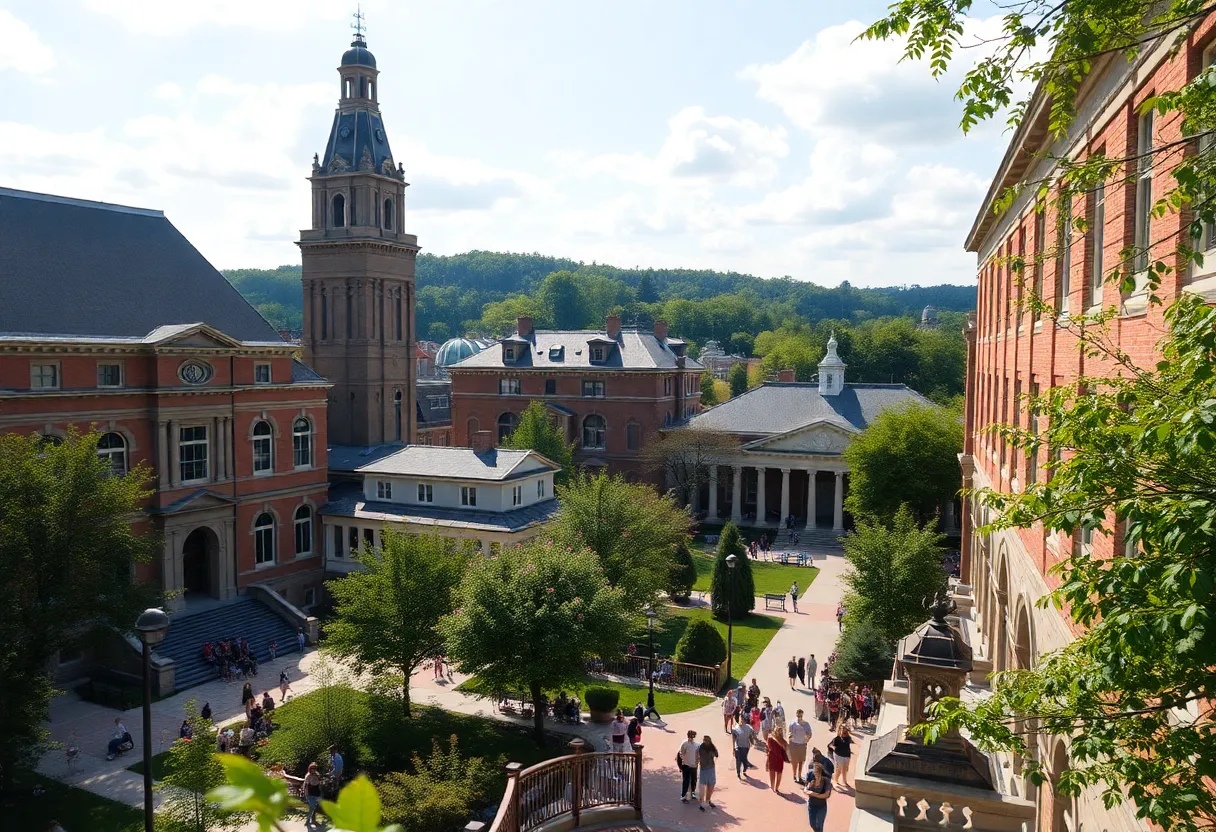News Summary
Vanderbilt University, established in 1872 in Nashville, Tennessee, has evolved into a comprehensive institution known for its commitment to education, research, and community. With a rich history influenced by its benefactor Cornelius Vanderbilt, the university continues to expand its offerings, including various programs in arts and sciences. Its notable alumni and innovative research facilities contribute to its reputation as a hub of academic excellence, fostering a vibrant community of around 10,000 students.
Nashville: Home to Vanderbilt University and Its Academic Journey
Nestled in the vibrant city of Nashville, Tennessee, Vanderbilt University stands as a shining beacon of education and research. Established back in 1872 under the name of Central University by the Southern branch of the Methodist Episcopal Church, this esteemed institution has undergone many transformations over the years, thanks to the vision of its benefactor, the shipping and railroad tycoon, Cornelius Vanderbilt.
A Charitable Foundation Leads to Academic Pursuits
In an astounding display of philanthropy, Cornelius Vanderbilt donated a whopping $1,000,000 in 1873, paving the way for the university’s formal establishment we know today. Classes officially commenced in 1875, marking the beginning of a rich academic tradition. The initial setup divided the university into various departments focusing on academics, Bible studies, law, and medicine. What was once a modest foundation has blossomed into a full-fledged comprehensive university.
Innovations and Academic Divisions
Fast forward a few years, and by 1879, the first doctorate was awarded, showcasing Vanderbilt’s commitment to higher education. The establishment of the engineering department in 1886 further exemplified the university’s ambition. Over the years, the school saw significant administrative transformations, with the Methodists retaining control until 1914, before allowing it to evolve into the diverse institution it is today.
Expanding Educational Offerings
Vanderbilt didn’t stop there; it continued to expand its academic offerings. The Graduate School was founded in 1935, and the acquisition of the George Peabody College for Teachers in 1979 added a rich legacy to its educational repertoire. The Peabody College dates back to 1785, initially starting as Davidson Academy, emphasizing Vanderbilt’s long-standing commitment to education.
A Musical Touch
The arts weren’t left behind either. The Blair School of Music came into being in 1964 and officially joined the Vanderbilt family in 1981. Now, students can pursue various degrees across multiple disciplines, from the College of Arts and Science to the School of Engineering, Peabody College, and the Blair School of Music.
A Growing Community
With an enrollment of around 10,000 students, Vanderbilt has fostered a vibrant community that is buzzing with energy and innovation. The Jean and Alexander Heard Library stands as a majestic testament to this thriving spirit, boasting more than two million volumes and featuring an impressive television news archive that stretches back to 1968.
A Hub of Research Excellence
Vanderbilt has earned its stripes as a comprehensive research university, particularly known for its top-notch medical programs. Renowned research is conducted at facilities like the John F. Kennedy Center for Research on Human Development and the Robert Penn Warren Center for the Humanities. The Vanderbilt Institute for Public Policy Studies and Arthur J. Dyer Observatory also contribute to the university’s reputation for academic excellence. It is this environment that nurtures bright minds who are destined to make significant impacts in various fields.
Illustrious Alumni and Faculty
Speaking of bright minds, Vanderbilt boasts a remarkable list of alumni who have made their mark in various domains. From astronomer Edward Emerson Barnard to poets Randall Jarrell and James Dickey, the university’s legacy is enriched by its distinguished graduates. Faculty members have equally contributed to the institution’s prestige, with notable figures such as Stanley Cohen and E.W. Goodpasture leading the charge in fields ranging from medicine to law.
Transformative Literary Contributions
After World War I, the university became a hub for the Fugitives literary circle, featuring celebrated writers like John Crowe Ransom and Robert Penn Warren. This creative atmosphere has undoubtedly fueled generations of literary talent and continues to inspire students today.
Vanderbilt University isn’t just an academic institution; it is a place where history and innovation meet, where past achievements set the stage for future greatness. So, whether you’re an aspiring student or a curious observer, there’s no doubt that Vanderbilt will continue to leave a mark on the academic landscape of the nation and beyond!
Deeper Dive: News & Info About This Topic
HERE Resources
Nashville Chamber of Commerce Appoints New Leader
Celebrate Martin Luther King Jr. Week in Nashville
Nashville Remembers Civil Rights Leaders and Icons
Vanderbilt Women’s Basketball Dominates Georgia with 108-82 Victory
Vanderbilt Commodores Secure Victory Over Dayton
Vanderbilt School Women’s Basketball Shines in Home Game
Vanderbilt University Women’s Basketball Team Prepares for Dayton Clash
Vanderbilt School Launches New Institute of National Security
Vanderbilt Women’s Basketball Kicks Off Season with School Day Event
Vanderbilt University School News: Senior Day Football Bash
Additional Resources
- Encyclopedia Britannica: Vanderbilt University
- Encyclopedia Britannica: Cornelius Vanderbilt
- Encyclopedia Britannica: Blair School of Music
- Encyclopedia Britannica: Peabody College
- Encyclopedia Britannica: Edward Emerson Barnard
- Wikipedia: Vanderbilt University
- Google Search: Vanderbilt University News
- Google News: Vanderbilt University
- Google Scholar: Vanderbilt University
- Encyclopedia Britannica: Vanderbilt University Search






